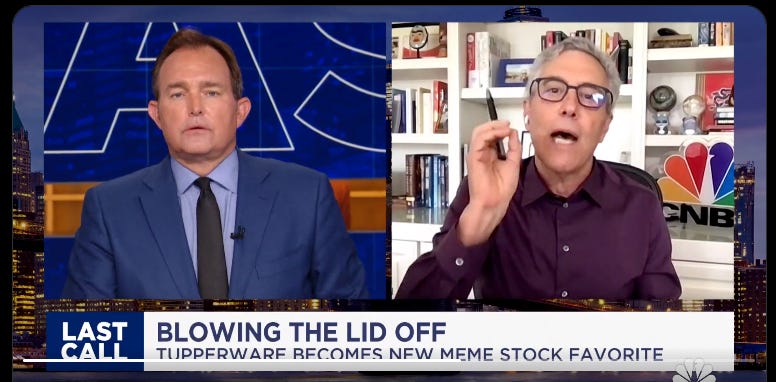This Time Will Be No Different
The Tupperware, Yellow edition
Just when you thought this market couldn't get loopier, along comes one of our old friends to make us forget the bubble ever happened...
I'm talking, of course, about Tupperware Brands (TUP).
Back in April, I wrote a mini case study on how such an iconic brand could be so screwed up. As I said at the time...
Just because a brand is great, doesn't mean it's a good investment.
I have no idea why the stock is rising the way it is beyond short squeezes and whatever other games people play... with a stock, no less, that is barely hanging on to its New York Stock Exchange listing by its fingernails.
What I do know is that investors hoping Tupperware is the next Hertz (HTZ) – the original meme stock that was saved from the clutches of bankruptcy – had better fasten their seatbelts, because... Hertz, Tupperware ain't.
That's pretty much what I said last week on CNBC, when Last Call host Brian Sullivan suggested that Tupperware might be the second coming of Hertz...
Unlike Hertz, Tupperware wasn't getting smashed by the pandemic, causing an already-rocky situation to get worse...
To the contrary, as I laid out in my case study, Tupperware's stock was catapulted by the pandemic, as was its business... which until then was barely alive. Just take a look at a chart of its stock.
Before the pandemic escalated, TUP shares were hovering around $1.
As I've written previously, the reality was and remains that Tupperware's direct sales business model doesn't work the way it used to. It's broken. Unlike its heyday, when Tupperware was Tupperware, the company now competes in a crowded market, with products that are mostly sold at retail.
Tupperware itself is trying to shift to a hybrid model, which includes retail...
It's doing so because its business model is broken.
But barring something coming out of left field to save Tupperware (other than a wing and a prayer), the facts are the facts:
The company hasn't filed a quarterly or annual financial statement with the U.S. Securities and Exchange Commission ("SEC") since November 2022.
The company has "identified multiple prior period misstatements and material weaknesses in internal control" that are likely to lead to "the restatement of its previously issued financial statements."
Maybe the most important: As recently as June, Tupperware said it would file its revised financials by mid-July. That has since been pushed back to late September. Something stinks, like somebody forgot to fully close one of the lids on one of its containers that had something rotten inside.
Meanwhile, people are bidding up this stock like it's the second coming of Hertz...
As I said on CNBC last week and even last night and I'll say again: What we're seeing is either illegal insider trading (doubtful) or short covering that’s feeding on itself (probably) and/or hype feeding on hype (most likely) on the fear of missing out on this "once-in-a-lifetime opportunity." (That last part was sarcasm.)
Repeating what I've said before: There is no doubt in my mind that Tupperware the brand will survive. The public company? Not so much.
Speaking of survival, or lack thereof...
Tupperware isn't the only penny stock on steroids. Have you seen trucking company Yellow (YELL) lately?
The stock roughly tripled in two trading days (albeit from nearly zero) after the company, in effect, went out of business. Yellow shut down and said that it's filing for bankruptcy.
That makes complete sense, right? Of course, it doesn't.
Yellow didn't just say it's filing for bankruptcy, but literally shut down... as it went out of business.
Maybe it was short covering or manipulation or betting that this nearly 100-year-old company certainly will be saved.
Or not...
As transportation guru Donald Broughton of Broughton Capital told me (his words)...
With more $7.50 a share in NEGATIVE tangible book value per share there, is absolutely no value in the common equity shares. Also, this calculation doesn't include obligations that are not on the balance sheet, which in YELL's case are substantial (starting with the Teamsters pension fund, which was underfunded before YELL missed making its recent payments).
There are just over 51 million shares outstanding, but today 148.8 million shares were traded. Several possible explanations, with the most likely being amateurs.
Even as the price of shares went up, the price of the put contracts (especially the October and January expirations) stayed the same or only declined by a tiny amount – suggesting the pros know how this ends and didn't blink.
My friend Matt Malgari of Kailash Concepts put it best in a note last week about this market, when he said...
Today, like in 2001, investors are betting on overpriced quality and speculative garbage due to a predictable combination of behavioral errors.
This time will be no different.
DISCLAIMER: This is solely my opinion based on my observations and interpretations of events, based on published facts, and should not be construed as investment advice.
Feel free to contact me at herbgreenberg@substack.com. You can follow me on Twitter @herbgreenberg.






Now that I think about it, I can’t even remember the last time I was invited to a Tupperware party. Does not look good for TUP.
Great read, thanks Herb!